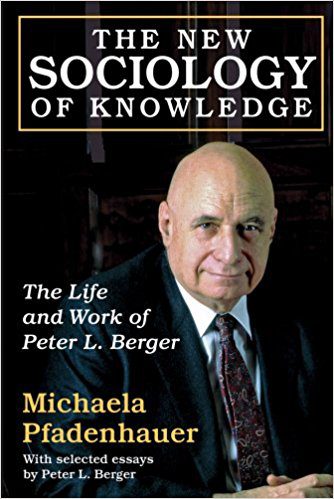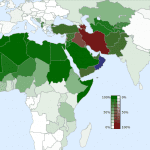Peter Berger has died at the age of 88.
One of the most prominent figures in the field of sociology, Berger was a pioneer in the sociology of religion.
Describing himself as an “incurable Lutheran” of the ELCA variety (though critical of much of that denomination’s liberal tendencies), Berger was sympathetic to evangelicals and other cultural conservatives.
After the jump, I will give some of his contributions, not only to sociology but to contemporary conservative thought and religion.
Berger once believed in the “secularization theory,” that modernity means getting less and less religious, but then he shot it down:
Modernity does not necessarily produce secularity. It necessarily produces pluralism, by which I mean the coexistence in the same society of different worldviews and value systems.
That changes the status of religion. It’s a challenge for every religious tradition. But it’s not the challenge of secularity; it’s a different challenge. The problem with modernity is not that God is dead, as some people hoped and other people feared. There are too many gods, which is a challenge, but a different one.
Berger also helped develop the “new class” theory, in which those who produce “knowledge” compete against those who produce tangible goods. In doing so, he accounted for the new wealthy liberal elite:
This class struggle, let it quickly be said, is not the one that Marxists still fantasy about, proletariat pitted against bourgeoisie, the wretched of the earth rising against their oppressors. Rather, it is a struggle between two elites. On the one side is the old elite of business enterprise, on the other side a new elite composed of those whose livelihood derives from the manipulation of symbols — intellectuals, educators, media people, members of the “helping professions,” and a miscellany of planners and bureaucrats. This latter grouping has of late been called the “new class” in America. . . .
In modern technological societies a diminishing proportion of the labor force is occupied in the production and distribution of material goods — that activity which was the economic base of the old capitalist class or bourgeoisie. Instead, an increasing number of people are occupied in the production and distribution of symbolic knowledge; these are the people enumerated above, and, if a class is defined by a particular relation to the means of production (as Marx, for one, proposed); then indeed there is here a new class. Like other classes, it is stratified within itself. And like other classes, it develops its own subculture.
The current class struggle is between the new knowledge class and the old business class. As in all class struggles, this one is over power and privilege. The new class is a rising class, with its own very specific (and identifiable) vested interests. But, in the public rhetoric of democracy, vested interests are typically couched in terms of the general welfare. In this, the new class is no different from its current adversary. Just as the business class sincerely believed (presumably still believes) that what is good for business is good for America, the new class believes that its own interests are identical with the “public interest.” It so happens that many of the vested interests of the new class depend on miscellaneous state interventions; indeed, a large portion of the new class is economically dependent an public-sector employment or subsidization.
Once this is seen, it comes as no surprise that the new class, if compared with the business class, is more “statist” in political orientation — or, in other words, is more on the “left.” Many if not most of the great liberal programs since the New Deal have served to enhance the power and privilege (not to mention the prestige) of the new class; not surprisingly, its members are devoted to these programs.
In A Rumor of Angels: Modern Society and the Rediscovery of the Supernatural, Berger wrote about experiences of “transcendence” that point to a supernatural reality. I’ll let Wikipedia summarize his point: “In daily life, people experience symbols and glimpses of existence beyond empirical order and of transcendent existence. Berger calls these ‘rumours of angels.’ People feel in times of great joy, in never-ending pursuit of order against chaos, in the existence of objective evil, and in the sense of hope that there exists some supernatural reality beyond that of human existence.”
In his essay Two Lutheran Tribes, Berger discusses the differences between the ELCA, which is influenced by mainline Protestantism, and the LCMS, which is influenced by evangelicals. He discusses other aspects of American Lutheranism, concluding that both tribes have a greater sense of freedom than other Christian traditions.
Berger also wrote An Invitation to Sociology, a book that rocked my world when I was a Freshman at the University of Oklahoma.
From Jeremy Weber, Died: Peter Berger, Prominent Sociologist of Religion | News & Reporting | Christianity Today:
Peter Berger, an “incurable Lutheran” who became one of America’s most respected sociologists of religion, has died.
Boston University (BU) announced the passing this week of the 88-year-old professor emeritus, who founded the school’s Institute on Culture, Religion, and World Affairs in 1985 and led it to become a leading source of scholarship on “religion in an age of globalization.”Southern Seminary president Al Mohler praised Berger as “perhaps the most influential social thinker of our times” and “one of the individuals I cite most frequently.”
Berger’s writing was “so good that it made all the theologians just want to be sociologists when they grew up,” stated Gregory Thornbury, president of The King’s College, in a tweet that also praised scholar Rodney Stark.
“There have been few scholars as independently-minded and as influential,” tweeted Hunter Baker, author of The End of Secularism and a professor of political science at Union University.
Berger was revered among evangelical scholars, though not an evangelical himself.
“This is not my community. I’m evangelisch but not evangelical,” he told Gordon College’s Center for Faith and Inquiry (CFI) in a 2013 interview. “I usually describe myself as incurably Lutheran, but I’m very comfortable with evangelicals. And between evangelicals and mainline Protestants, I prefer evangelicals for reasons theologically.”
UPDATE: Read also this account by the president of Gordon College, D. Michael Lindsay, on “Why Christian Scholars Loved Peter Berger.”














